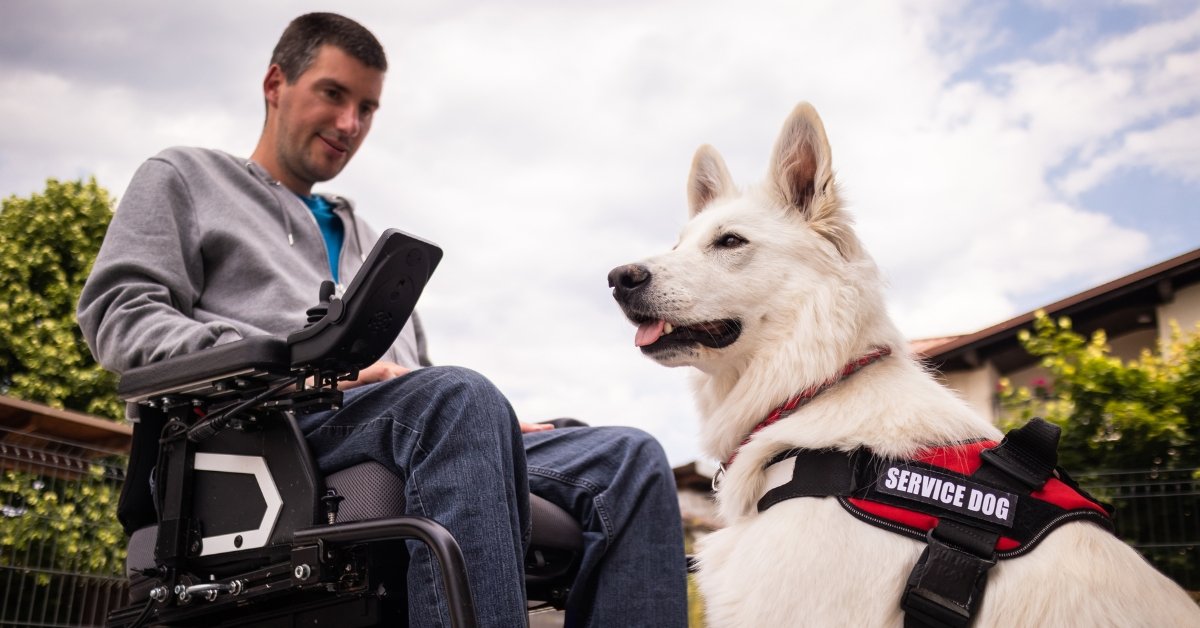If you are in Massachusetts and dealing with a disability, getting a service dog for free might change your life. Follow these seven easy steps to qualify.
Table Of Contents
Introduction
Imagine waking up daily knowing you have a loyal companion, ready to help with tasks that make life easier.
That is the magic of a service dog.
These incredible animals are not just pets; they are trained professionals that assist people with disabilities, from guiding those with vision impairments to alerting folks with hearing loss or providing stability for mobility challenges.
And the best part?
In Massachusetts, you can get one free through dedicated organizations and programs.
As someone passionate about helping people live fuller lives, and writing on behalf of THOUSIF Inc. – USA, a company dedicated to empowering individuals through informative resources, we have delved deep into this topic.
Service dogs have been transforming lives for decades, and with the proper steps, you could be next.
However, let us be real: the process is not overnight.
It requires patience, preparation, and a small quantity of know-how.
That is why I am breaking it down into seven straightforward steps.
First off, understand that “free” does not mean zero effort.
These dogs cost thousands to train – often $20,000 to $50,000 – but non-profit organizations cover those expenses through donations, grants, and fundraising.
In Massachusetts, state laws align with federal guidelines under the Americans with Disabilities Act (ADA), ensuring your rights once you have your dog.
No official certification is needed, but the dog must be trained to perform specific tasks related to your disability.
Whether you are dealing with physical limitations, mental health conditions like PTSD, or something else, this guide is for you.
We will cover everything from qualifying to ongoing care, with tips to make the journey smoother.
By the end, you will feel empowered to take that first step. Let us dive in!
Step 1: Determine If You Qualify For A Service Dog
Before you consider applications, you must determine if a service dog is right for you and if you meet the basic qualifications.
This step involves self-reflection and understanding the legal side of things.
Start by defining what a service dog is.
Under federal law, a service dog is a dog (yes, specifically a dog, though miniature horses are sometimes allowed in rare cases) individually trained to work or perform tasks for a person with a disability.
These tasks could include pulling a wheelchair, retrieving dropped items, reminding you to take medication, or detecting oncoming seizures.
Emotional support animals provide comfort just by being there and do not count as service dogs; they have different rights.
In Massachusetts, the laws mirror the ADA but add some state-specific protections.
For example, if your dog behaves correctly, you cannot be denied access to public places like restaurants, stores, or public transportation.
No vests or IDs are required by law, though many handlers use them for ease.
Importantly, there is no state registry or certification process, and anyone claiming otherwise might be trying to sell you something unnecessary.
To qualify personally, you must have a disability substantially limiting one or more major life activities.
This could be physical, like mobility issues from multiple sclerosis, or invisible, like psychiatric conditions such as anxiety or depression, where the dog performs tasks like deep pressure therapy during panic attacks.
Kids as 12 might qualify through some programs, but most require you to be at least 18.
Here is a quick self-checklist to see if you are on the right track:
- Do you have a diagnosed disability? (Get a doctor’s note if you do not already have one – it will be crucial later.)
- Can a dog realistically help with specific tasks? (Think beyond companionship.)
- Are you able to care for a dog? (This includes feeding, grooming, vet visits, and exercise – service dogs need love too!)
- Do you live in a stable environment? (Organizations often check for this.)
Suppose you are nodding, “Yes, great!”
However, be honest with yourself.
Service dogs are a big commitment; they are working animals, not just cuddly friends.
A common mistake people make is rushing in without considering the long term.
For instance, if allergies or housing restrictions are an issue, explore hypoallergenic breeds like poodles, which some programs offer.
From my experience researching stories like this, I have heard from folks who thought they qualified but realized a service dog was not the best fit.
One woman I came across online shared how she initially wanted a dog for anxiety, but found therapy sessions more effective.
Take time here, and maybe journal about your daily challenges and how a dog could help.
This step alone can save you months of frustration.
To add depth, consider the types of disabilities commonly assisted:
- Visual impairments: Guide dogs lead the way.
- Hearing loss: Dogs alert to sounds like doorbells or alarms.
- Mobility: They provide balance or retrieve items.
- Psychiatric: Tasks like interrupting harmful behaviors.
- Medical alerts: For diabetes, seizures, or allergies.
Trivia Break: Did you know the first formal service dog training program started in Germany in 1916? It was for blinded World War I veterans and sparked a global movement that’s helped millions since.
By the end of this step, you should have a precise “yes” or “maybe.”
If yes, move on – you are one step closer!
Step 2: Assess Your Specific Needs And Choose The Type Of Service Dog
Now that you have confirmed eligibility, it is time to get personal.
What exactly do you need from a service dog?
This step involves matching your disability to the right kind of assistance, and it is where many people find clarity – or excitement!
Think about your daily life.
You might need a larger breed for bracing or pulling if you have mobility issues.
A smaller dog with grounding pressure might be ideal for psychiatric support.
Hearing dogs are often alert and quick, while guide dogs for the blind are typically calm and focused labs or goldens.
In Massachusetts, programs tailor dogs to needs.
For example, if you are a veteran with PTSD, specialized tasks like nightmare interruption could be key.
Do not worry if you are unsure; most organizations help assess this during applications.
Here is a table to compare common service dog types:
| Type | Tasks | Best | Breeds |
|---|---|---|---|
| Guide Dog | Navigating obstacles, stopping at curbs | Visual impairments | Labrador Retrievers, Golden Retrievers |
| Hearing Dog | Alerting to sounds like phones or smoke alarms | Hearing loss | Cocker Spaniels, Mixed Breeds |
| Mobility Assistance Dog | Retrieving items, opening doors, providing balance | Physical disabilities | Great Danes, Standard Poodles |
| Psychiatric Service Dog | Deep pressure therapy, medication reminders | Mental health conditions | Any breed, often Labs or Goldens |
| Medical Alert Dog | Detecting low blood sugar, oncoming seizures | Diabetes, epilepsy | Labs, Golden Retrievers, Poodles |
Use this as a starting point.
Factor in your lifestyle, too.
Do you travel a lot?
Live in a small apartment?
Some dogs, like Great Danes from local programs, are great for balance but need space.
A Tip: Consult your doctor or therapist. They can write a letter detailing how a service dog would mitigate your disability. This is not just paperwork; it is your ticket to proving need.
Common pitfalls?
Overestimating what one dog can do.
Dogs are amazing, but they are not robots.
Training focuses on 2-3 core tasks initially.
Also, consider costs; even “free” dogs have ongoing expenses like food ($500/year) and vet care ($300-500/year).
Budget accordingly.
We have chatted with people who have gone through this, and one shared how choosing a psychiatric dog helped her manage daily outings she once avoided.
It is life-changing when it fits right.
Spend a week observing your routines.
Note pain points, that is where your dog shines.
Ready?
On to research!
Step 3: Research Organizations Offering Free Service Dogs In Massachusetts
The meaty part is finding someone who can provide for your dog without the hefty price tag.
Massachusetts has several stellar non-profits, and nationwide ones serve here, too.
Remember, “free” means they cover training costs; you might handle minor fees like travel.
Top Local Picks
- NEADS (World Class Service Dogs) in Princeton: Trains for physical, hearing, and veteran needs. They have placed thousands since 1976.
- Service Dog Project in Ipswich: Specializes in Great Danes for mobility/balance. Free to qualified applicants.
- Putnam Service Dogs: Covers MA residents with physical disabilities; dogs are fully trained and placed free.
- Operation Delta Dog: Focuses on veterans with PTSD/TBI; rescues and trains shelter dogs.
National organizations serving MA
- Canine Companions: Free dogs for various disabilities; long history.
- Paws With A Cause: Custom training for mobility, hearing, seizures.
- Dogs for Better Lives: Hearing and autism assistance.
- 4 Paws for Ability: Great for kids with autism or veterans.
How do you research?
Visit their websites, read reviews, and call.
Look for ADI accreditation; it ensures high standards.
Table Of Organizations
| Organization | Focus | Eligibility | Time | Notes |
|---|---|---|---|---|
| NEADS | Physical, hearing, veterans, children (12+) | Disability documentation, ability to care | 1-2 years | Application starts with quiz |
| Service Dog Project | Mobility/balance | Ages 12-65, stable home | Varies | Great Danes only |
| Putnam Service Dogs | Physical disabilities | Within 3 hours of NY (includes MA) | 1-3 years | Free placement |
| Canine Companions | All disabilities | 18+ for adults | 6-24 months | Free, including follow-up |
| Paws With A Cause | Mobility, hearing, seizures | Various | 2+ years | Custom-trained |
Veterans: Check VA benefits – sometimes they cover costs.
Tips: Apply to multiple if eligible. Waitlists are common (1-3 years), so start early. Fundraising? Some help with grants if needed.
One Story: An MA resident waited 18 months for a NEADS dog but said it was worth every day. Research thoroughly; the proper organization makes all the difference.
Step 4: Gather Documentation And Prepare Your Application
Paperwork time!
Organizations need proof that you are a good match.
This step builds your case.
Essentials
- Doctor’s Letter: Confirms disability and how a dog helps.
- Personal Statement: Why do you need a dog? What are the daily impacts?
- References: From friends, family, or professionals.
- Proof of Income/Home: Shows stability.
For free programs, emphasize financial need if required – though most do not charge anyway.
Avoid jargon; explain simply. E.g., “My anxiety causes panic attacks; a dog could apply pressure to calm me.”
Practice interviews – many have them. Be genuine.
Mistake: Incomplete apps. Double-check!
This prep shows commitment. You have got this!
Step 5: Submit Your Application And Navigate The Waiting Process
Hit send!
Then, patience.
- Process: Pre-qualify quiz, full app, interview, home visit, matching.
- Waits: Long, but use time wisely – learn dog care via books or classes.
Stay in touch; updates help.
If denied, ask why and reapply elsewhere.
Emotional Tip: Join support groups. It is normal to feel anxious.
Step 6: Participate In Matching And Team Training
Matched!
Now, bond.
- Most Programs: Require 1-2 weeks of on-site training. Participants learn commands and public access. In MA, they practice local scenarios like T rides.
- Post Training: Follow-ups ensure success.
Celebrate – your team is forming!
Step 7: Maintain Your Service Dog And Know Your Rights
- Ongoing: Vet care, exercise, refresher training.
- Rights in MA: Access everywhere public, no pet fees in housing.
- Challenges: Public ignorance – educate calmly.
- Yearly costs: $800-1,000. Plan.
Your dog retires around 10-12 years; prepare for that.
It is a partnership for life.
Conclusion
Whew, we have covered a lot from qualifying to lifelong care.
With these seven steps, getting a free service dog in Massachusetts is achievable thanks to amazing organizations and supportive laws.
Remember, it is about enhancing your independence and joy.
If this sparked your interest, explore more articles on THOUSIF Inc. – USA for tips on disability resources, pet care, and living well.
We are here to help.
Leave a comment or reach out.
Here is to new beginnings with a wagging tail by your side!






